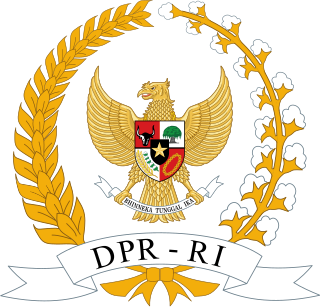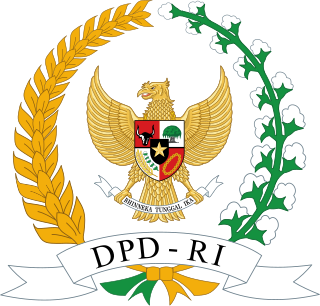A member of parliament (MP) is the representative in parliament of the people who live in their electoral district. In many countries with bicameral parliaments, this term refers only to members of the lower house since upper house members often have a different title. The terms congressman/congresswoman or deputy are equivalent terms used in other jurisdictions. The term parliamentarian is also sometimes used for members of parliament, but this may also be used to refer to unelected government officials with specific roles in a parliament and other expert advisers on parliamentary procedure such as the Senate parliamentarian in the United States. The term is also used to the characteristic of performing the duties of a member of a legislature, for example: "The two party leaders often disagreed on issues, but both were excellent parliamentarians and cooperated to get many good things done."
Legislative elections were held in on 5 April 2004 for both houses of the People's Consultative Assembly of Indonesia. This included all 550 seats in the People's Representative Council and 128 seats of the newly-formed Regional Representative Council.

The House of Representatives of the Republic of Indonesia, is one of two elected chambers of the People's Consultative Assembly (MPR), the national legislature of Indonesia. It is considered the lower house, while the Regional Representative Council (DPD) serve as the upper house; while the Indonesian constitution does not explicitly mention the divide, the DPR enjoys more power, privilege, and prestige compared to the DPD.

The House of Representatives of Puerto Rico is the lower house of the Legislative Assembly of Puerto Rico, the bicameral territorial legislature of Puerto Rico. The House, together with the Senate, control the legislative branch of the government of Puerto Rico.

The term Government of the Republic of Indonesia can have a number of different meanings. At its widest, it can refer collectively to the three traditional branches of government – the executive branch, legislative branch and judicial branch. The term is also used colloquially to mean the executive and legislature together, as these are the branches of government responsible for day-to-day governance of the nation and lawmaking. At its narrowest, the term is used to refer to the executive branch in form of the Cabinet of Indonesia as this is the branch of government responsible for day-to-day governance.


The president of the Republic of Indonesia is both the head of state and the head of government of the Republic of Indonesia. The president leads the executive branch of the Indonesian government and is the commander-in-chief of the Indonesian National Armed Forces. Since 2004, the president and vice president are directly elected to a five-year term, once renewable, allowing for a maximum of 10 years in office.
The Petition of Fifty was a document protesting then President Suharto's use of state philosophy Pancasila against political opponents. Issued on 5 May 1980 as an "Expression of Concern", it was signed by fifty prominent Indonesians including former Army Chief of Staff Nasution, former Jakarta governor Ali Sadikin and former prime ministers Burhanuddin Harahap and Mohammad Natsir.
House of Representatives is the name of legislative bodies in many countries and sub-national entities. In many countries, the House of Representatives is the lower house of a bicameral legislature, with the corresponding upper house often called a "Senate". In some countries, the House of Representatives is the sole chamber of a unicameral legislature.

On March 12, 1815, a few days after the legal start of the 14th Congress, but long before the first meeting of that Congress, David Bard (DR), who'd been re-elected to the 9th district, died. A special election was held on October 10 to fill the vacancy left by his death.
The 1814 United States elections occurred in the middle of Democratic-Republican President James Madison's second term, during the First Party System. Members of the 14th United States Congress were chosen in this election. During the 14th Congress, Indiana joined the union. The election took place during the War of 1812.

The Minsk agreements were a series of international agreements which sought to end the Donbas war fought between armed Russian separatist groups and Armed Forces of Ukraine, with Russian regular forces playing a central part. The first, known as the Minsk Protocol, was drafted in 2014 by the Trilateral Contact Group on Ukraine, consisting of Ukraine, Russia, and the Organization for Security and Co-operation in Europe (OSCE), with mediation by the leaders of France and Germany in the so-called Normandy Format. After extensive talks in Minsk, Belarus, the agreement was signed on 5 September 2014 by representatives of the Trilateral Contact Group and, without recognition of their status, by the then-leaders of the self-proclaimed Donetsk People's Republic (DPR) and Luhansk People's Republic (LPR). This agreement followed multiple previous attempts to stop the fighting in the region and aimed to implement an immediate ceasefire.
General elections are scheduled to be held in Indonesia on 14 February 2024 to elect the President, Vice President, People's Consultative Assembly (MPR) which consists of the DPR and the DPD, and members of local legislative bodies. The newly elected members of the MPR will be sworn in on 1 October 2024, while the elected President and Vice President will be sworn in on 20 October 2024. Incumbent President Joko Widodo is ineligible to run for a third term due to the term limits established by the Indonesian constitution.

The Speaker of the House of Representatives, is the presiding officer of the House of Representatives of Indonesia. The speaker is the political and parliamentary leader of the House of Representatives and is simultaneously the Council's presiding officer. The speakers also perform various other administrative and procedural functions.

The House of Representatives of the United States of Indonesia was one of the two national legislative assemblies in the United States of Indonesia (RUSI). The council was formed after the establishment of the Indonesian federal state, consisting of 150 members.

The Provisional House of Representatives was the first Indonesian legislature under the Provisional Constitution of 1950. The council was formed after the transition of Indonesia to a unitary state on 17 August 1950. The council initially consisted of 236 members, with 213 members remaining prior to the dissolution of the council in 1956.

Second Commission of the House of Representatives in Indonesia, more commonly known as the Second Commission, is one of eleven commissions for the 2019-2024 period, within the People's Representative Council. The commission has the scope of tasks in the fields of domestic administration and regional autonomy; state apparatus and bureaucratic reform, elections, land and agrarian Reform.

Fourth Commission of the House of Representatives, more commonly known as Fourth Commission, is one of eleven commissions for the 2019-2024 period, within the People's Representative Council of Indonesia. The commission has the scope of tasks in the fields of agriculture, the environment, forestry, and marine affairs.










